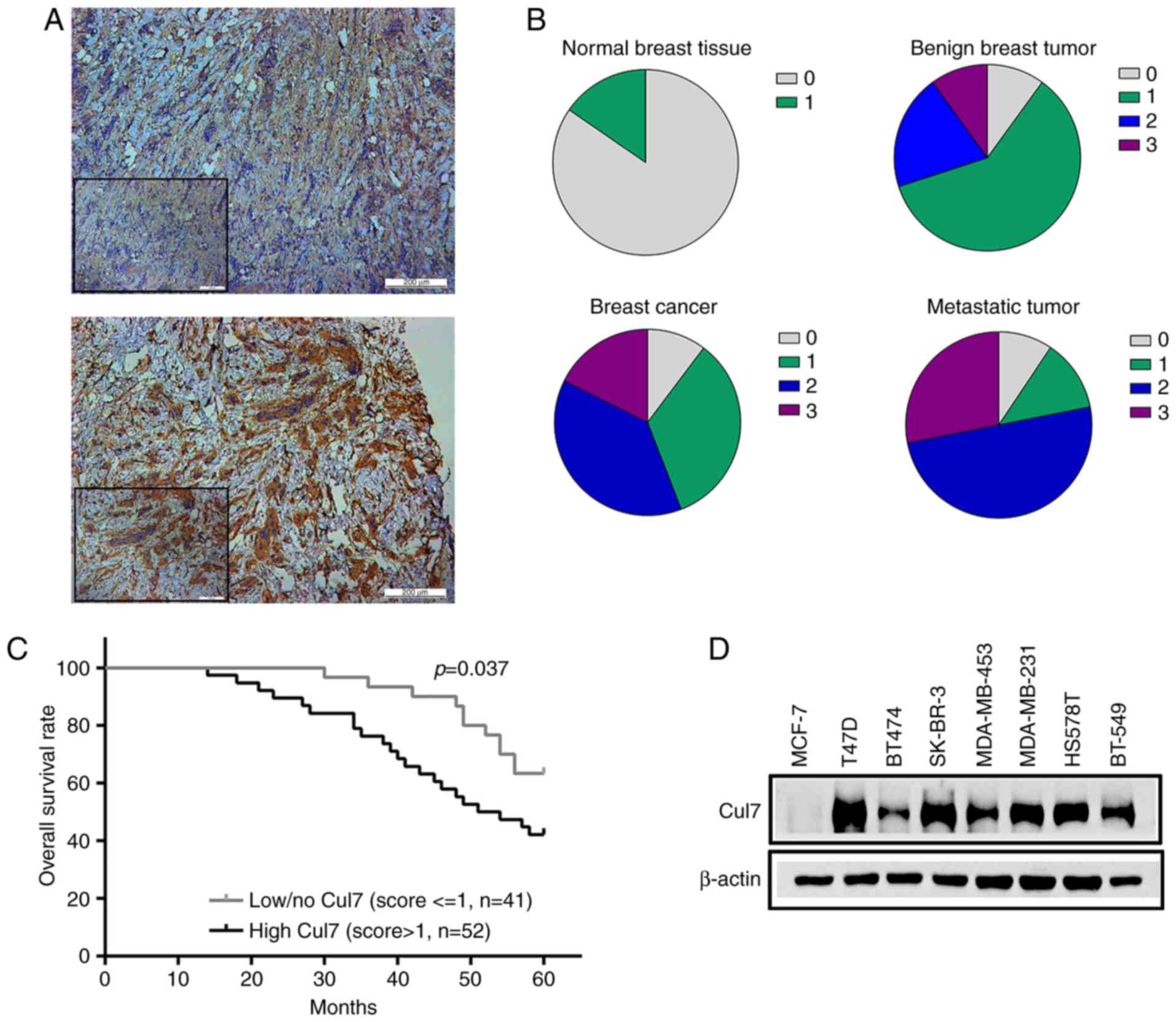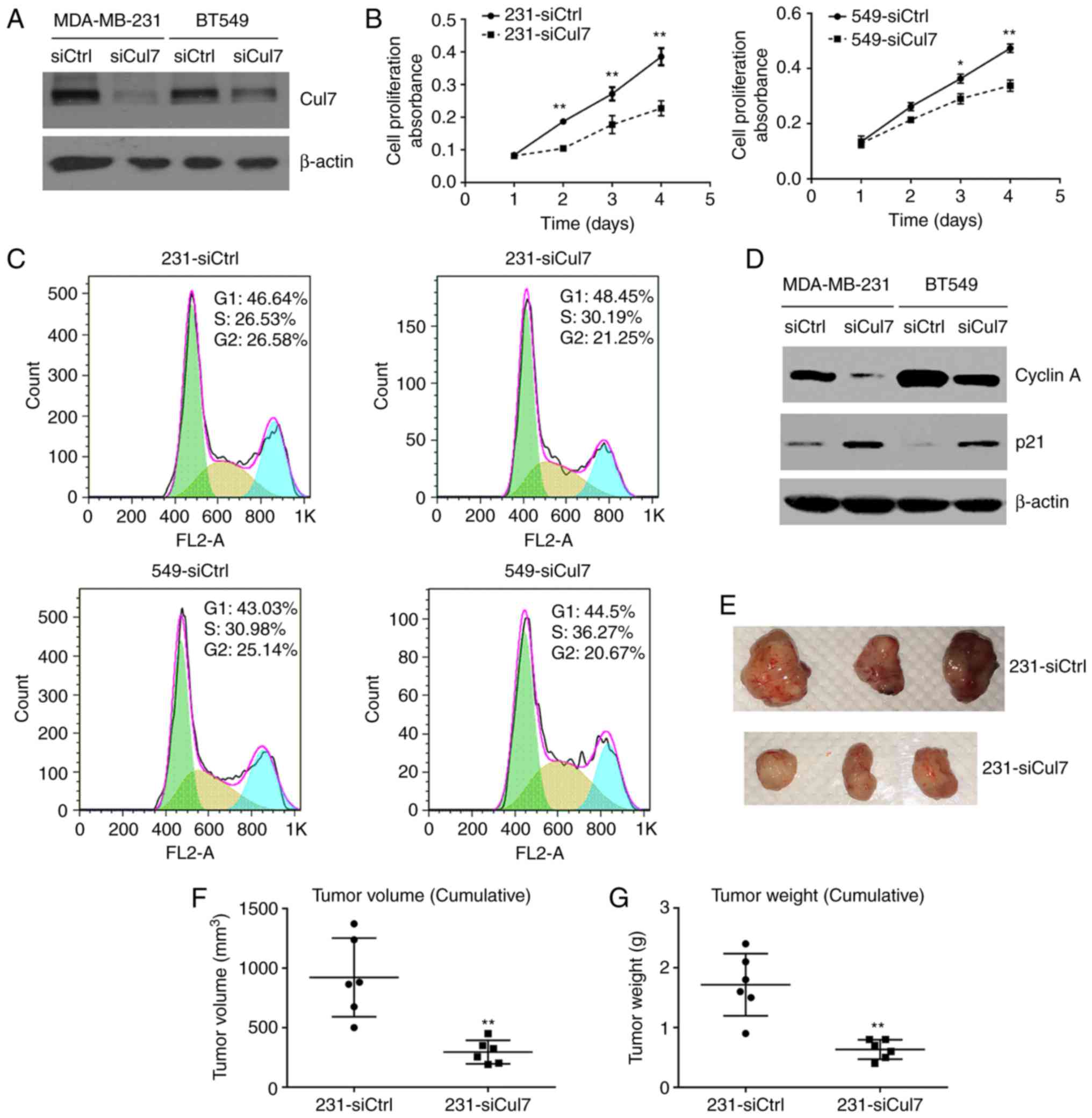|
1
|
Ding F, Xiao H, Wang M, Xie X and Hu F:
The role of the ubiquitin-proteasome pathway in cancer development
and treatment. Front Biosci. 19:886–895. 2014. View Article : Google Scholar
|
|
2
|
Jain CK, Arora S, Khanna A, Gupta M,
Wadhwa G and Sharma SK: The ubiquitin-proteasome pathway an
emerging anticancer strategy for therapeutics: A patent analysis.
Recent Patents Anticancer Drug Discov. 10:201–213. 2015. View Article : Google Scholar
|
|
3
|
Kitagawa K and Kitagawa M: The SCF-type E3
ubiquitin ligases as cancer targets. Curr Cancer Drug Targets.
16:119–129. 2016. View Article : Google Scholar : PubMed/NCBI
|
|
4
|
Sarikas A, Hartmann T and Pan ZQ: The
cullin protein family. Genome Biol. 12:2202011. View Article : Google Scholar : PubMed/NCBI
|
|
5
|
Zhao Y and Sun Y: Cullin-RING ligases as
attractive anti-cancer targets. Curr Pharm Des. 19:3215–3225. 2013.
View Article : Google Scholar : PubMed/NCBI
|
|
6
|
Min KW, Kim DH, Do SI, Sohn JH, Chae SW,
Pyo JS, Park CH, Oh YH, Jang KS, Kim HL, et al: Diagnostic and
prognostic relevance of Cullin1 expression in invasive ductal
carcinoma of the breast. J Clin Pathol. 65:896–901. 2012.
View Article : Google Scholar : PubMed/NCBI
|
|
7
|
Kim B, Nam HJ, Pyo KE, Jang MJ, Kim IS,
Kim D, Boo K, Lee SH, Yoon JB, Baek SH, et al: Breast cancer
metastasis suppressor 1 (BRMS1) is destabilized by the Cul3-SPOP E3
ubiquitin ligase complex. Biochem Biophys Res Commun. 415:720–726.
2011. View Article : Google Scholar : PubMed/NCBI
|
|
8
|
Saucedo-Cuevas LP, Ruppen I, Ximénez-Embún
P, Domingo S, Gayarre J, Muñoz J, Silva JM, García MJ and Benítez
J: CUL4A contributes to the biology of basal-like breast tumors
through modulation of cell growth and antitumor immune response.
Oncotarget. 5:2330–2343. 2014. View Article : Google Scholar : PubMed/NCBI
|
|
9
|
Wang H, Chen Y, Lin P, Li L, Zhou G, Liu
G, Logsdon C, Jin J, Abbruzzese JL, Tan TH, et al: The CUL7/F-box
and WD repeat domain containing 8 (CUL7/Fbxw8) ubiquitin ligase
promotes degradation of hematopoietic progenitor kinase 1. J Biol
Chem. 289:4009–4017. 2014. View Article : Google Scholar : PubMed/NCBI
|
|
10
|
Xu X, Sarikas A, Dias-Santagata DC, Dolios
G, Lafontant PJ, Tsai SC, Zhu W, Nakajima H, Nakajima HO, Field LJ,
et al: The CUL7 E3 ubiquitin ligase targets insulin receptor
substrate 1 for ubiquitin-dependent degradation. Mol Cell.
30:403–414. 2008. View Article : Google Scholar : PubMed/NCBI
|
|
11
|
Guo H, Wu F, Wang Y, Yan C and Su W:
Overexpressed ubiquitin ligase Cullin7 in breast cancer promotes
cell proliferation and invasion via down-regulating p53. Biochem
Biophys Res Commun. 450:1370–1376. 2014. View Article : Google Scholar : PubMed/NCBI
|
|
12
|
Fu J, Lv X, Lin H, Wu L, Wang R, Zhou Z,
Zhang B, Wang YL, Tsang BK, Zhu C, et al: Ubiquitin ligase cullin 7
induces epithelial-mesenchymal transition in human choriocarcinoma
cells. J Biol Chem. 285:10870–10879. 2010. View Article : Google Scholar : PubMed/NCBI
|
|
13
|
Li H, Yang B, Xing K, Yuan N, Wang B, Chen
Z, He W and Zhou J: A preliminary study of the relationship between
breast cancer metastasis and loss of heterozygosity by using exome
sequencing. Sci Rep. 4:54602014. View Article : Google Scholar : PubMed/NCBI
|
|
14
|
Wu J, He Z, Wang DL and Sun FL: Depletion
of JMJD5 sensitizes tumor cells to microtubule-destabilizing agents
by altering microtubule stability. Cell Cycle. 15:2980–2991. 2016.
View Article : Google Scholar : PubMed/NCBI
|
|
15
|
Zhang D, Yang G, Li X, Xu C and Ge H:
Inhibition of liver carcinoma cell invasion and metastasis by
knockdown of Cullin7 in vitro and in vivo. Oncol Res. 23:171–181.
2016. View Article : Google Scholar : PubMed/NCBI
|
|
16
|
Men X, Wang L, Yu W and Ju Y: Cullin7 is
required for lung cancer cell proliferation and is overexpressed in
lung cancer. Oncol Res. 22:123–128. 2015. View Article : Google Scholar : PubMed/NCBI
|
|
17
|
Kim SS, Shago M, Kaustov L, Boutros PC,
Clendening JW, Sheng Y, Trentin GA, Barsyte-Lovejoy D, Mao DY, Kay
R, et al: CUL7 is a novel antiapoptotic oncogene. Cancer Res.
67:9616–9622. 2007. View Article : Google Scholar : PubMed/NCBI
|
|
18
|
Xi J, Zeng ST, Guo L and Feng J: High
expression of Cullin7 correlates with unfavorable prognosis in
epithelial ovarian cancer patients. Cancer Invest. 34:130–136.
2016. View Article : Google Scholar : PubMed/NCBI
|
|
19
|
Bendris N, Lemmers B, Blanchard JM and
Arsic N: Cyclin A2 mutagenesis analysis: A new insight into CDK
activation and cellular localization requirements. PLoS One.
6:e228792011. View Article : Google Scholar : PubMed/NCBI
|
|
20
|
Pagano M, Pepperkok R, Verde F, Ansorge W
and Draetta G: Cyclin A is required at two points in the human cell
cycle. EMBO J. 11:961–971. 1992.PubMed/NCBI
|
|
21
|
Yam CH, Fung TK and Poon RY: Cyclin A in
cell cycle control and cancer. Cell Mol Life Sci. 59:1317–1326.
2002. View Article : Google Scholar : PubMed/NCBI
|
|
22
|
De Boer L, Oakes V, Beamish H, Giles N,
Stevens F, Somodevilla-Torres M, Desouza C and Gabrielli B: Cyclin
A/cdk2 coordinates centrosomal and nuclear mitotic events.
Oncogene. 27:4261–4268. 2008. View Article : Google Scholar : PubMed/NCBI
|
|
23
|
Henglein B, Chenivesse X, Wang J, Eick D
and Bréchot C: Structure and cell cycle-regulated transcription of
the human cyclin A gene. Proc Natl Acad Sci USA. 91:pp. 5490–5494.
1994; View Article : Google Scholar : PubMed/NCBI
|
|
24
|
Gartel AL and Radhakrishnan SK: Lost in
transcription: p21 repression, mechanisms, and consequences. Cancer
Res. 65:3980–3985. 2005. View Article : Google Scholar : PubMed/NCBI
|
|
25
|
Amos LA: What tubulin drugs tell us about
microtubule structure and dynamics. Semin Cell Dev Biol.
22:916–926. 2011. View Article : Google Scholar : PubMed/NCBI
|
|
26
|
Nogales E: An electron microscopy journey
in the study of microtubule structure and dynamics. Protein Sci.
24:1912–1919. 2015. View
Article : Google Scholar : PubMed/NCBI
|
|
27
|
Szarama KB, Gavara N, Petralia RS, Kelley
MW and Chadwick RS: Cytoskeletal changes in actin and microtubules
underlie the developing surface mechanical properties of sensory
and supporting cells in the mouse cochlea. Development.
139:2187–2197. 2012. View Article : Google Scholar : PubMed/NCBI
|
|
28
|
Carranza G, Castaño R, Fanarraga ML,
Villegas JC, Gonçalves J, Soares H, Avila J, Marenchino M,
Campos-Olivas R, Montoya G, et al: Autoinhibition of TBCB regulates
EB1-mediated microtubule dynamics. Cell Mol Life Sci. 70:357–371.
2013. View Article : Google Scholar : PubMed/NCBI
|
|
29
|
Bendre S, Rondelet A, Hall C, Schmidt N,
Lin YC, Brouhard GJ and Bird AW: GTSE1 tunes microtubule stability
for chromosome alignment and segregation by inhibiting the
microtubule depolymerase MCAK. J Cell Biol. 215:631–647. 2016.
View Article : Google Scholar : PubMed/NCBI
|
|
30
|
Gergely ZR, Crapo A, Hough LE, McIntosh JR
and Betterton MD: Kinesin-8 effects on mitotic microtubule dynamics
contribute to spindle function in fission yeast. Mol Biol Cell.
27:3490–3514. 2016. View Article : Google Scholar : PubMed/NCBI
|
|
31
|
Yan J, Yan F, Li Z, Sinnott B, Cappell KM,
Yu Y, Mo J, Duncan JA, Chen X, Cormier-Daire V, et al: The 3M
complex maintains microtubule and genome integrity. Mol Cell.
54:791–804. 2014. View Article : Google Scholar : PubMed/NCBI
|


















